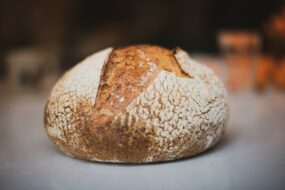August 7, 2021 • Life for Leaders
Scripture – John 6:47-51 (NRSV)
“Very truly, I tell you, whoever believes has eternal life. I am the bread of life. Your ancestors ate the manna in the wilderness, and they died. This is the bread that comes down from heaven, so that one may eat of it and not die. I am the living bread that came down from heaven. Whoever eats of this bread will live forever; and the bread that I will give for the life of the world is my flesh.”
Read all of John 6 here.
Focus
May you receive the abiding love of Christ, the living bread, as you set out to set right what needs to be set right in your life and in our troubled world.
Devotion
Every Sunday in my tradition, we read an Old Testament passage, a Psalm, a passage from the Epistles, and a passage from the Gospels. When I write these weekend devotionals for you based on the lectionary, I have to pick two out of those four readings. But this time, you are in luck—it just so happens that Mark Roberts’ devotionals for last week and this coming week have been, and will continue to be, on one of the readings associated with this Sunday—Ephesians 4:25-5:2. So, leaving Ephesians in Mark’s able hands, I want to talk to you about the Gospel reading for today.
I explained in a recent devotional why, in the middle of making our way through the Gospel of Mark, we pause to spend a few weeks in John 6. Last time I talked with you about John 6, we discussed what I like to call the Feeding of the More Than 5000 When You Count Women and Children. After that dramatic miracle, the crowd wants to make Jesus a king. So Jesus withdraws. (Well, he walks on the water for the disciples in John 6:16-21. Then he withdraws.) But the next morning, the crowd gets into boats and crosses the lake to find him. When they do, they engage him in a long dialogue about bread—it takes up most of the rest of John 6. It is about bread, but also about more than bread.
When the crowd first arrives, he points out that they have showed up to see him because of the miracle feeding he performed the day before. While it isn’t necessarily a bad thing that they “ate [their] fill of the loaves” (John 6:26), he assures them that he has something better in store. All earthly food will eventually perish, but there is “food that endures for eternal life” (John 6:27).
As good Jewish believers engaged in disputation with a rabbi would, they begin to discuss relevant stories in the Hebrew Scriptures. (In fact, at some point they move into the synagogue to do this, because that’s where they are by the time we get to John 6:59). They talk about the gift of manna given as the Israelites journeyed from Egypt to Caanan (Exodus 16:1-36), which they attribute to Moses and Jesus reminds them ultimately came from God the Father (John 6:32). This discussion about manna continues into today’s passage, where Jesus notes that, as great a gift as the manna was, those who ate it died eventually—but those who eat the eternal food that God gives will not die.
What was most shocking to those listeners and to the disciples (John 6:61), and remains shocking to us, is what that food consists of. Repeatedly throughout John 6, Jesus insists that he himself is the living bread, the new manna, the bread of heaven, the bread of life, and that he will give his flesh for the life of the world. He culminates with this statement:
Very truly, I tell you, unless you eat the flesh of the Son of Man and drink his blood, you have no life in you. Those who eat my flesh and drink my blood have eternal life, and I will raise them up on the last day; for my flesh is true food and my blood is true drink (John 6:53-55).
Combining these statements with Jesus’s actions at the Last Supper and the statement Paul makes about the Last Supper in 1 Corinthians 1:23-27, early Christians believed they were eating Jesus’s flesh and drinking his blood when they came to the Communion table; that by doing so they were abiding in Christ, and he in them (John 6:56); and that receiving the bread and wine was a pledge and a foretaste of eternal life with Christ. (Incidentally, because of all of this, the Roman government thought they were cannibals.) This is still essentially what my (Anglican) tradition believes. As a priest, when I give people the bread at Communion, I do so with the words “This is the body of Christ, the bread of heaven.”
Yesterday, as you may remember, we talked about stories that go so desperately wrong and need God’s help to be set right. Communion is not a magic ritual that immediately sets everything right. But over the past decades, I have found that coming over and over again to the table to receive the true bread from heaven and abide in Christ has helped me at times when many wrong things needed to be set right. May you, too, receive the abiding love of Christ, the living bread, as you set out to set right what needs to be set right in your life and in our troubled world.
Reflect
What is your understanding of Communion?
What is your understanding of abiding in Christ?
How has Jesus been the bread of heaven to you?
Act
The famous hymn “Guide Me, O Thou Great Jehovah” uses the imagery of both Exodus 16 and John 6. Pray and worship with this hymn, and ask Christ to abide in your heart. (P.S. The hymn was originally written in Welsh, and you can see and hear a little Welsh at that link.)
Pray
Jesus, thank you for being the bread of heaven to us and to all the world. Amen.
 Sign up to receive a Life for Leaders devotional each day in your inbox. It’s free to subscribe and you can unsubscribe at any time.
Sign up to receive a Life for Leaders devotional each day in your inbox. It’s free to subscribe and you can unsubscribe at any time.
Find all Life for Leaders devotions here. Explore what the Bible has to say about work at the unique website of our partners, the Theology of Work Project. Commentary on today’s Life for Leaders theme can be found here: Jesus the Bread of Life (John 6)

Jennifer Woodruff Tait (PhD, Duke University) is the editor of and frequent contributor to Life for Leaders. She is also the managing editor of Christian History magazine and web editor for the Theology of Work Project, and a priest in the Episcopal Church. She has written a book of poetry, Histories of Us. Jennifer lives in Berea, Kentucky, with her husband, Edwin, and their two daughters.
Click here to view Jennifer’s profile.





Thank you, Jennifer, for this lovely devotion! I read it immediately after worshiping with my Anglican (Reformed Episcopal) church via Zoom in which we celebrate Communion remotely with pre-sanctified Host delivered to us by our Rector. We use a different prayer book (BCP 2011 — http://www.bcp2011.com) so our readings differ from the ones listed here, but I just love our being able to pray the Scriptures in community through the BCP.
The main reason I moved to Reformed Episcopal from nondenominational evangelical churches is Holy Communion. In a former church, communion was only offered at the Sunday evening services, and as a young mother with four small children and living 30 minutes from our church, it simply was not possible for me to attend the evening service. Thus, I went without communion for THREE YEARS. The senior pastor shrugged it off when I mentioned it to him, more or less blaming my priorities. When I mentioned this issue to the associate pastor, he arranged a communion service for Wednesday night when I was at church for a women’s Bible study which took place during the kids’ AWANA program. I cried as I finally took communion — it was such a blessing, something I had been hungering and thirsting for.
So when I was studying other church’s beliefs on Communion, I came across the beliefs of the Episcopal Church, and their beliefs matched what I had long felt in my heart. We lived in a very small mountain village (with one community church) a 45-minute drive away from our evangelical church (Evangelical Free Church of North America), so I was so relieved to find a small Episcopal Church (Reformed Episcopal) in a larger town halfway down the mountain. That was 17 years ago, and I just love worshiping in a manner that takes Communion weekly — and as far more than a mere symbol. 😉
Soli Deo Gloria,
Susanne 🙂
Thanks for this lovely comment, Suzanne! I used to be Methodist before following my desire for weekly Eucharist into Anglicanism.
Apostolic Pentecostal Oneness Believers Knows That You Must Be Born Again With The Holy Spirit And Water 💧Meaning Baptism In Jesus Name Acts2:38 💧Filled With The Holy Spirit Speaking In Tongues 👅Read The Bible New Testament Acts Of The Apostles Doctrines Everyday Everyone Everywhere Right Now Today ✅ whyaretheresomanychurches.com